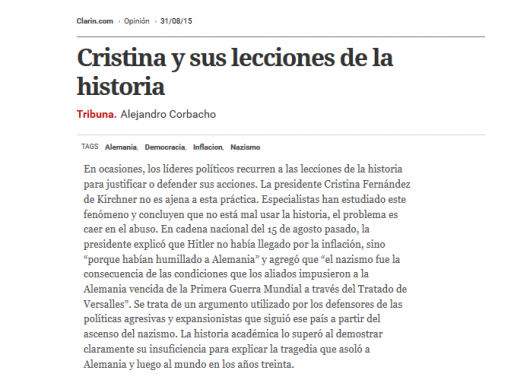
We have all heard about Keynes but who in the world is Corbacho? If you don´t understand, don´t worry. Alejandro Corbacho is Director of UCEMA’s Department of Political Science and International Relations, and he also fails to understand. Even worse, he does not understand about what he writes and publishes. And beware he is an academician, or at least he is presented as such. So please, don’t let your self-esteem go down.
Let me explain. On August 5, I said at the Goverment house that Hitler’s rise to power had not been caused by inflation but rather because of Germany’s humiliation due to the shameful conditions that the Allies during World War II had imposed on the country after its defeat in the Treaty of Versailles.
Today, reading the news, I see on page 20 of Clarín a title that caught my attention: “Cristina and her history lessons». There, Corbacho, this UCEMA’s academician, refutes what I said. “Political leaders rely on the lessons of history to justify or defend their actions.” Sic. Thanks for calling me “political leader”. It might have slipped his mind. It also happens to academicians…
Corbacho affirms: “Experts say that those who resort to tell the history with that perspective show great confidence in his statements and they lack inhibition to use the past in different ways, even though they know little about the subject.” The bold font is not mine. It is a resource used by Corbacho to highlight that not only I have no inhibitions, but also I know nothing.
Well, what has Keynes to do with all this? A lot. He was the official representative of England at the Peace Conference until June 7, 1919. He also had a seat as the agent of the English Minister of Finance in the Supreme Economic Council. He resigned «when it became clear that the hope of a substantial change in the projected terms of peace could no longer be maintained.» Keynes himself explains it in the preface to his book «The Economic Consequences of Peace».
In this book, which obviously Corbacho did not read, Keynes developed the foundations of his opposition to the terms of the Treaty. A paragraph from p. 95 defines his position. Textual Keynes:
See, my statement of August 5 was not a product of my lack of inhibition, but my respectful reading of John Maynard Keynes. Not only one of the principal figures of the Versailles Treaty, but one of the greatest economists, historians and (real) academics in world history.
Following his criticism of the conditions of the Treaty they wouldn’t hire him again for years. You know when did they call him again? After World War II and the horrors of Nazism he predicted. Please, carefully re-read the paragraph on page 95. Short, but worth re-reading, so much intelligence and clarity. Intelligence and clarity that are rare in contemporary times and, above all, in some academicians.
And you know what did they call him for? For the Bretton Woods Agreement. Yes! The Economic Agreement between the Great Powers after World War II. That war he had said would happen. Those are the things that I envy. Such a great mind, so much intelligence… It looks like he did not have inhibitions and prejudices, that when distorted and exaggerated, are major barriers to understanding and -chiefly- to govern.
I‘ll tell you how the Bretton Woods and Keynes thing ended… Keynes had a proposal, which was known as the proposal of England (he represented that country) to create a monetary system with not only one reserve currency because that would alter the global economic balance by generating inequalities that affect the weakest countries. The other position of the Bretton Woods was held by the US representative, Harry White, who proposed a system that ended enthroning the dollar as the world’s most powerful currency. You can imagine who won. Harry «Green» White.
Keynes died on April 21, 1946. What he had predicted happened again: a single currency would cause imbalances in the world economy. Keynes entered the world’s economy history. Nobody remembers Harry “Green”, despite the fact that the world suffers the consequences of his proposal.
Do you think Corbacho will be remembered by anyone? It’s not important. But we Argentinians would be so much better off if some would read and know more about what they write and speak.